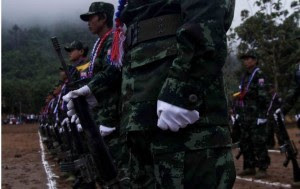A statement released by members of the different Karen armed groups laid out plans for the major Karen armed organisations to form a united Karen force, the Kawthoolei Armed Forces (KAF).
The statement spoke on behalf of the four major Karen armed organisations, the Karen National Liberation Army (KNLA), the Karen National Defence Organisation (KNDO), the Democratic Karen Benevolent Army (DKBA), and the Karen National Union and Karen National Liberation Army Peace Council (KNU/KNLA-PC)
 The agreement was co-signed by General Baw Kyaw Heh, the KNLA’s Vice-Chief of Staff, General Ner Dah Mya, Chief of KNDO, General Saw Lah Pwe, DKBA’s Chief of Staff and Colonel Saw Tiger, Tactical Commander for KNU/KNLA-PC Border Security and Development Tactical Command.
The agreement was co-signed by General Baw Kyaw Heh, the KNLA’s Vice-Chief of Staff, General Ner Dah Mya, Chief of KNDO, General Saw Lah Pwe, DKBA’s Chief of Staff and Colonel Saw Tiger, Tactical Commander for KNU/KNLA-PC Border Security and Development Tactical Command.
General Ner Dah Mya, Chief of the KNDO who also acts as a spokesperson for the KAF, spoke to Karen News about the statement.
“At the moment, there are so many Karen armed groups and in the future it would be good if we are under one group – the KAF. We have had a lot of discussion among our groups. We reached an agreement to go under the umbrella of the KAF. Having many groups does not look good in the eyes of the international community.”
The KAF statement cited recent attacks by government forces as a reason to unite.
It said: “The Burma military troops have been using flimsy excuses to intimidate, disarm and attack the ethnic armed organizations which have signed ceasefire agreements with the government. They have been arresting the personnel of ethnic armed organizations and innocent civilians, on a wide scale.
“For that reason, in order to be able to protect the long suffering people, we have to reunify the Karen national armed resistance forces.”
The KAF statement also made a sweeping pledge to follow the four principles of the Karen national hero and former head of the KNU, Saw Ba U Gyi, but it failed to go into specific details and left many questions unanswered.
Some of those questions included: Who would lead the KAF? Would the KAF would have the full backing of each organisation? What political organisations, if any, would they represent? What chain of command will be put in place to control the different member organisations?
At the time of writing, Karen News was waiting for responses to these questions.
Gen. Der Nah Mya admitted that although the groups had agreed to join together militarily, they yet have to reach an agreement on who will take the political lead and added that there was need for further discussion among the groups.
Following the KAF statement, the KNU’s Defence Department, that comprises of both the KNLA and KNDO, put out a statement on 14th October reaffirming that both organisations still come under the political leadership of the KNU.
The KNU also stated that General Baw Kyaw Heh, the KNLA’s Vice-Chief of Staff and General Ner Dah Mya, the KNDO Chief, had signed the KAF agreement in a personal capacity rather than as representatives of the KNU.
It also said that, according to policy made in its 15th Congress, the KNU is working toward the reunification of Karen armed forces and the KNLA’s Chief of Staff – General Saw Johnny – is leading the implementation of the reunification.
Similarly, the headquarters of the KNU/KNLA-PC issued a statement on October 14, sacking Colonel Saw Tiger from its organization. The statement claimed that Tactical Commander Colonel Saw Eh Kaw Htoo, also known as Saw Tiger, had repeatedly broken military rules and failed to follow orders from headquarters.
Members of the KAF have fought each other in the past as bitter foes. The DKBA fought with the KNU/KNLA for more than a decade following a split in 1995 when the DKBA temporarily joined the government side. A large portion of the government led Border Guard Force (BGF) currently fighting in Karen State against the DKBA are also ethnic Karen.



